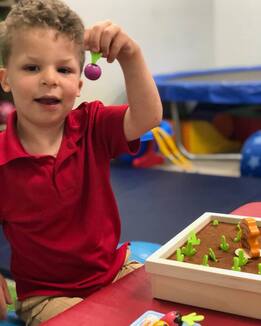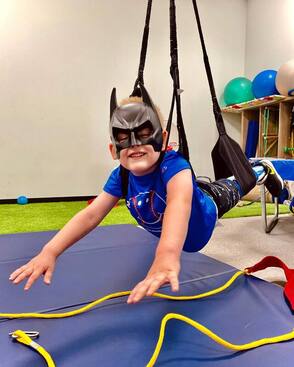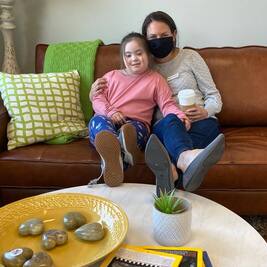Do you have a child that wiggles, slumps, or just can't sit properly in his/her chair at school or home? Does your child frequently fall, seem clumsy or uncoordinated? Does your child tire easily while playing physical or recreational activities, or have difficulty keeping up with peers his/her age? Your child may have gross motor delays or delays with sensory processing which may be inhibiting him/her from performing many age appropriate gross motor activities. Physical therapy addresses strength, balance/coordination, endurance, and sensory integration for children with special needs. Diagnoses commonly treated include: Developmental delay, Cerebral palsy, Down syndrome, Autistic spectrum disorders, and genetic disorders.

Occupational Therapy
Occupational therapy is the use of purposeful activity to maximize the independence of a child who is limited by a physical injury or illness, neurological or cognitive impairment, a developmental or learning disability, or sensory integration dysfunction. For a child, purposeful activities such as swinging, climbing, jumping, buttoning, drawing and writing are their "occupation." Under the guidance of a therapist, the child actively takes in movement and touch information in playful, meaningful and natural ways that may facilitate the brain to modulate these fundamental neural messages. The child responds favorably to SI treatment, because his/her nervous system is pliable and changeable. Occupational therapy helps the child build confidence and learn to succeed- and children love it!
Occupational therapy is the use of purposeful activity to maximize the independence of a child who is limited by a physical injury or illness, neurological or cognitive impairment, a developmental or learning disability, or sensory integration dysfunction. For a child, purposeful activities such as swinging, climbing, jumping, buttoning, drawing and writing are their "occupation." Under the guidance of a therapist, the child actively takes in movement and touch information in playful, meaningful and natural ways that may facilitate the brain to modulate these fundamental neural messages. The child responds favorably to SI treatment, because his/her nervous system is pliable and changeable. Occupational therapy helps the child build confidence and learn to succeed- and children love it!

Physical Therapy
Physical therapy addresses strength, balance/coordination, endurance, and sensory integration for children with special needs. Diagnoses commonly treated include: Developmental delay, Cerebral palsy, Down syndrome, Autistic spectrum disorders, and genetic disorders.Physical therapy can help strengthen trunk muscles for sitting extended periods of time. Stronger trunk muscles will assist your child with fine motor activities such as handwriting, drawing, or coloring as well as possibly increase their attention to task in school or at home. A strong trunk can also enable your child to breathe, communicate, and use their extremities more effectively. Physical therapy can help strengthen upper and lower extremities to assist with age appropriate gross motor functional and recreational activities such as running, jumping, and ascending and descending stairs safely.Do you have concerns regarding your child's gross motor development? The following list of gross motor developmental milestones is based on an average, typically developing child. Please note that these milestones may not apply to every child.
Gross-Motor developmental milestones:
Physical therapy addresses strength, balance/coordination, endurance, and sensory integration for children with special needs. Diagnoses commonly treated include: Developmental delay, Cerebral palsy, Down syndrome, Autistic spectrum disorders, and genetic disorders.Physical therapy can help strengthen trunk muscles for sitting extended periods of time. Stronger trunk muscles will assist your child with fine motor activities such as handwriting, drawing, or coloring as well as possibly increase their attention to task in school or at home. A strong trunk can also enable your child to breathe, communicate, and use their extremities more effectively. Physical therapy can help strengthen upper and lower extremities to assist with age appropriate gross motor functional and recreational activities such as running, jumping, and ascending and descending stairs safely.Do you have concerns regarding your child's gross motor development? The following list of gross motor developmental milestones is based on an average, typically developing child. Please note that these milestones may not apply to every child.
Gross-Motor developmental milestones:
- Rolls from tummy to back: 4-5 months
- Rolls back to tummy: 5-6 months
- Sitting independently: 7 months
- Creeps (Crawling): 8 months
- Cruises on furniture: 11 months
- Walks independently: 12-13 months
- Runs and jumps: 24 months

Speech Language Pathology
Milestone provides services for children of all ages for developmental delays, processing, social skills, autism, and many other areas of need.
Speech and language services available at Milestone for the following:
· Autism
· Verbal Apraxia (Kaufman trained)
· Fluency/Stuttering (Advanced training through the Stuttering Foundation)
· Phonological/Articulation
· Auditory Processing
· Voice Disorders
· Down Syndrome and other congenital disorders
· Social Language Disorders
Milestone provides services for children of all ages for developmental delays, processing, social skills, autism, and many other areas of need.
Speech and language services available at Milestone for the following:
· Autism
· Verbal Apraxia (Kaufman trained)
· Fluency/Stuttering (Advanced training through the Stuttering Foundation)
· Phonological/Articulation
· Auditory Processing
· Voice Disorders
· Down Syndrome and other congenital disorders
· Social Language Disorders